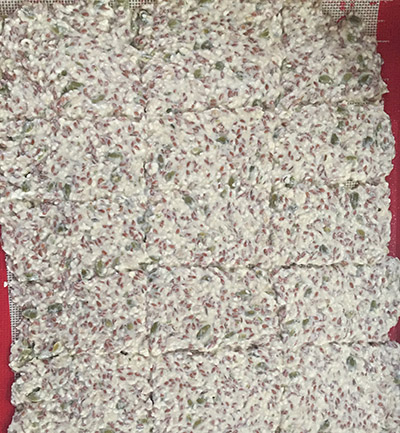
Good crackers became a bit of an obsession when I was living in the US. I spent one long, confused hour in a supermarket looking carefully at the contents labels of what was available and I discovered there wasn’t anything I wanted to buy.
I wasn’t after anything complicated. I just wanted something for dips, cheese, munching. Good in their own right and good with a topping.
The Australian benchmark for us was sesame Vitawheat. Crisp and seedy and delicious. The closest and healthiest commercial equivalent I could find in America at the time had three or four times the fat, sugar and salt, and a quarter of the fibre. And it wasn’t very crispy, either.
Every visitor who came from Australia brought a few packs of Vitawheat with them (and TimTams. Of course). It got us through the lean times.

I’m sure there are way better crackers available now. And we’ve moved on from that particular obsession too.
But the call of a good cracker has never gone away.
I’ve gone on and on about The New Nordic cookbook on this blog, but today’s crackers are actually the reason I got the book in the first place. I’ve made these more than any other thing in the book, and will continue to do so.
They are incredibly simple to make. The only real issue is making sure they don’t burn, because they can go

from toasty to bitter in a very short time. I have, as usual, played with the recipe a little to suit my tastes, and this version has a little less flour and more seeds. They last well.
Seedy crispbreads
A note on seeds: I used roughly equal proportions of sesame, sunflower, linseed (flax) and pepitas (pumpkin, these were not part of the original recipe, but they are a fantastic addition). I tried chia seeds but for some reason they made the finished product less crisp and so now I don’t use them.
Mix:
100g plain flour
250(ish)g mixed seeds
1tbs caraway seeds (optional)
1tbs fennel seeds (optional)
1tbs fennel seeds fresh toasted (in a frypan) and ground (the smell is amazing)
200ml water
 Spread the mix out as thin as you can on a baking sheet, leaving no holes. The recommendation is to sprinkle a little flour over, put some baking paper over that and roll it with a rolling pin, and then remove the paper. That worked OK for me but I now use a silicone baking mat as a base with a light spray of oil on it, and use a spatula to spread it out as thin and evenly as I can.
Spread the mix out as thin as you can on a baking sheet, leaving no holes. The recommendation is to sprinkle a little flour over, put some baking paper over that and roll it with a rolling pin, and then remove the paper. That worked OK for me but I now use a silicone baking mat as a base with a light spray of oil on it, and use a spatula to spread it out as thin and evenly as I can.
Sprinkle some salt flakes over the top. I score rectangles over the surface to make it easier to break neatly after, but it’s not essential

Bake in a 200C oven (fan-forced makes it a bit more even) for about 30 minutes. Watch carefully to see how it’s browning once you get past 25 or so minutes. The high oil content in the seeds means they are a little volatile and it can cross over from toasty to burnt quite quickly. You might need a few more minutes too. Just watch the colour.
Verdict: crispy, healthy, delicious.
Corinna Hente
